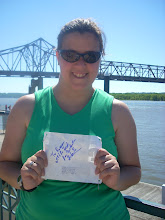This is my last week of freedom before my marathon training commences. Not that I haven't been hitting the pavement up till now. On the contrary, I'm just now finishing my pre-training. The only real difference is that I can actually let myself sleep in on the weekends and that my longest run was 5.16 miles. So, before I set out on this journey, I thought I'd take a step back and look at what the marathon is, who runs it and how it has evolved.
A modern day marathon is a 26.2 mile test of fortitude. For those keeping track, that's 26 miles, 385 yards. Some folks minimize the .2 but let me tell you, after the previous 26 miles, the .2 is a pretty big deal.
Those that are familiar with their ancient history might be familiar with how the marathon came about. The race really didn't start out as a race at all, but as a military task. Back in 490 B.C. Greece was living under Persian rule in Asia Minor (modern day Turkey) but not terribly happy about the situation and began to revolt. Not to be daunted Persians sent an army of 20,000 troops to Athens, and the fellas would eventually settle in Marathon - on a coastal plain in northern Greece. Well, a lot of stuff happened and then the Greeks won (Go Greeks!). A messenger, Phidippides, was sent from Marathon to Athens to announce the victory but had to be quick or his homeboys the Athenians were going to burn their 'hood if they sensed they would be defeated. The distance good old Phidi had to cover between the two cities was 25 miles. He successfully covered the distance, relayed the message, saved Athens and then fell over dead from the exertion. He obviously hadn't trained properly!
So if you're paying attention to my little history lesson, you might be asking yourself, "Hey if the distance between Marathon and Athens was only 25 miles, where did the other 1.2 come from?" (And if that's the case, props to you for remembering the .2) Well, that's were that damn Queen Alexandra comes into the picture. In 1908, the marathon had been an Olympic sport for 12 years. The Olympics were held in London that year and Edward VII's wife thought she'd like to watch the race but didn't care to actually go to the race. She had it come to her - specifically she had the race re-routed to go past Buckingham Palace, thus adding an additional mile and 385 yards.
So now that we've had our history lesson, let's move on to statistics. Given that I did enough original research when I was a graduate student, I'll be taking these already compiled statistics from the U.S.A. Track and Field Road Running Information Center, via Jeff Galloway's book on marathoning. Because of that, these stats are 9 years old but if you'd like to update the numbers and get back to me, feel free.
So here's marathoning by the numbers. In the year 2000, an estimated 451,000 people finished a marathon. Many more idiots started one and then realized those long training runs were in fact important and dropped out somewhere before tape.
The largest marathon in the world (at press time) was London, followed by New York City and then Chicago. I did Chicago in '02 with 35,000 of my closest friends. Though I have no statistics to back this up, I'm declaring the Walt Disney World Marathon to be the most expensive. In addition to the $125 entry fee, there's no end to the other "add-ons" one can choose - a $45 spaghetti dinner the night before, the race retreat entry that allows you access to more porta-potties, the $45 post race party at which you can purchase celebratory food, the ChEAR Squad membership where race spectators can pay to see you finish, and on and on and on.
Approximately 62% of marathon finishers are male and 38% are female. (I guess no one checked "other") The average age of a male marathoner is 38 and female is 35. So, that makes me younger and in possession of more X chromosomes than the average marathoner.
The winners of the major marathons are typically covering the distance somewhere between 2 hours and 7 minutes and 2 hours and 15 minutes. The bigger races "corral" runners letting the faster ones go first, then the next fastest and so on sometimes causing the slower runners to have to wait 15-20 minutes to cross the starting line. That means that the leaders of this race will probably be around mile 8 or 9 when I'm hitting mile 2. I hope they save some Gatorade for me.
So that's marathon 101. Before I sign off, though, a final thought. Approximately 1/10 of 1% of the world's population has run a marathon. Which makes me wonder, how many people are crazy enough to do it more than once?
Subscribe to:
Post Comments (Atom)

No comments:
Post a Comment